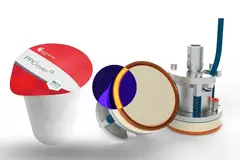Key takeaways
- Constantia Flexibles and watttron have developed a system that seals PP and aluminum lids on PP cups using a single system.
- The system uses watttron’s ring-heating technology, applying heat only to the outer sealing ring, reducing thermal stress and achieving faster heating and cooling.
- The technology simplifies production, eliminates the need for separate machines for different lid materials, and reduces equipment complexity.

Constantia Flexibles and watttron, a thermal technology provider, have jointly developed an approach to lidding that enables PP and aluminum lids to be sealed on PP cups using a single system. The approach builds on Constantia Flexibles’ PPCover, a monomaterial PP lidding solution designed to meet recyclability standards.
Integrating PPCover into existing sealing machines posed a technical challenge: achieving consistent, high-quality seals across various lid materials without compromising efficiency or causing material deformation, according to Constantia Flexibles.
The companies say that conventional sealing systems typically heat the entire sealing head, which can lead to issues such as curling from excessive heat exposure. This risk prompted Constantia Flexibles to develop more precise and adaptable sealing technologies.

Marcus Stein, CEO at watttron, says: “We developed our ring-heating technology to deliver precise energy exactly where it’s needed — no more, no less. That precision not only improves quality and flexibility, but also contributes meaningfully to energy efficiency in packaging lines.”
Claus Dworschak, market product manager for die cut lids at Constantia Flexibles, comments: “This is a strong one-fits-all solution in dairy lidding. It simplifies operations and enhances quality — exactly what our customers need.”
Energy-efficient solution
The ring-heating technology applies heat only to the outer sealing ring. This targeted method aims to reduce thermal stress on the lid material and boost energy efficiency. The companies say that the system heats and cools rapidly, typically at a rate of 10 to 20 degrees Celsius per second, and maintains the set temperature with a “high degree of accuracy.”
These features are also said to enable the system to power down safely during production stops, contributing to energy savings of up to 50% compared to conventional sealing methods.
The companies share that lab-scale tests using PPCover have confirmed the effectiveness of the approach, presenting “excellent peel behavior, strong internal pressure resistance, and reliable sealing for both PP and aluminum lids using the same equipment.”
The technology is said to eliminate the need for separate machines or setups for different lid materials, simplify production processes, and reduce equipment complexity. According to the companies, the system also integrates with all inspection capabilities, allowing real-time detection and removal of defective cups.












